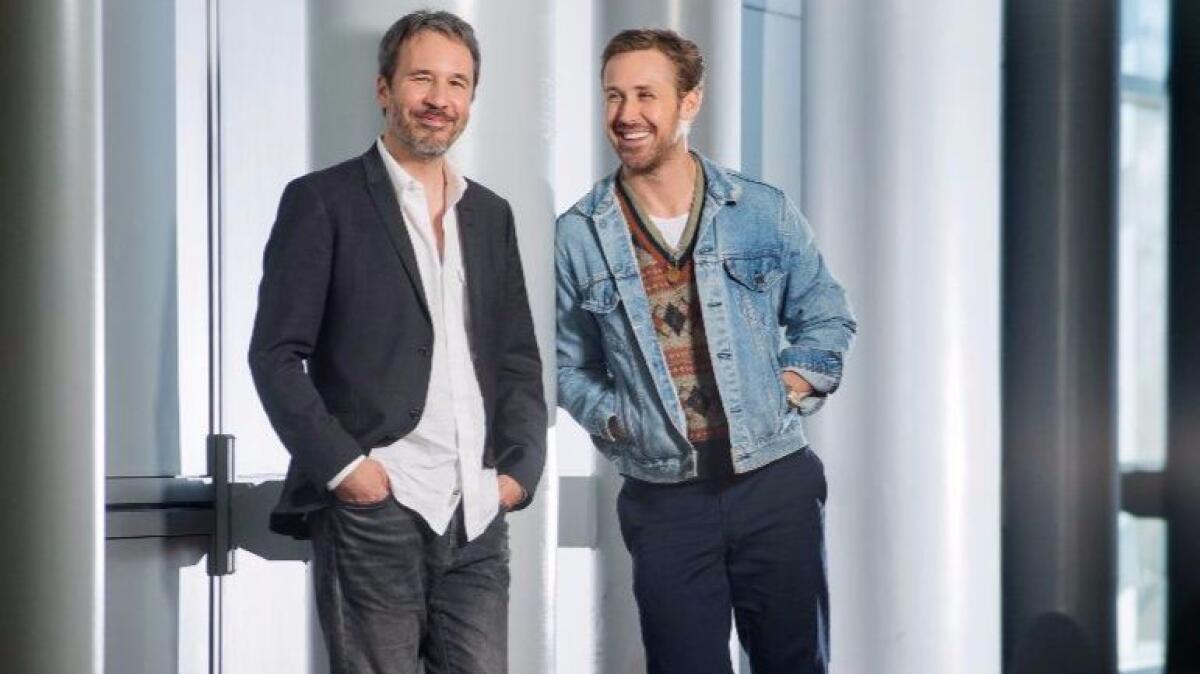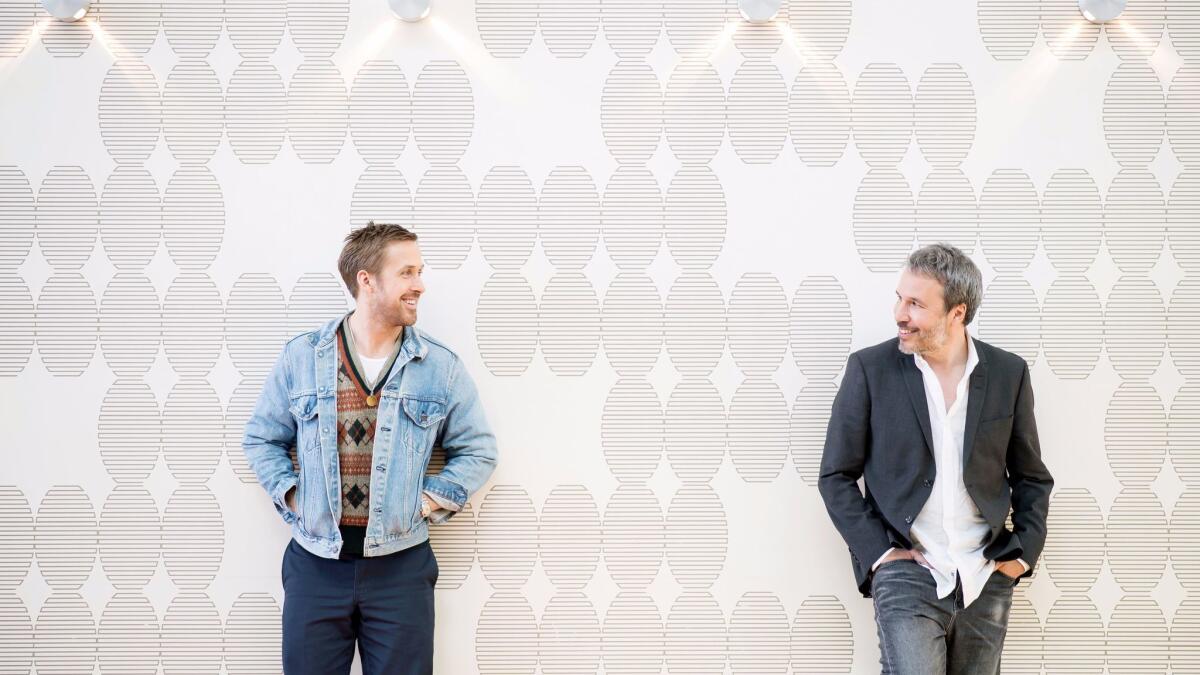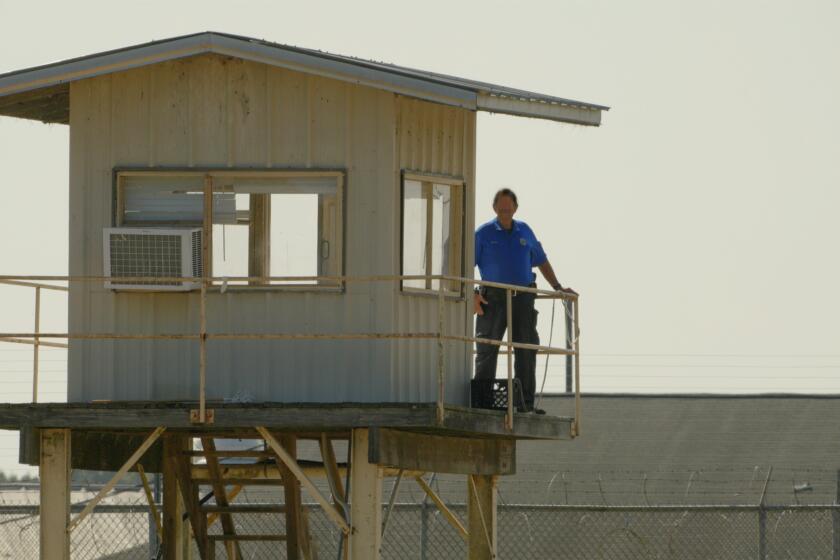Ryan Gosling and director Denis Villeneuve have ‘no idea how the world will react’ to the risky ‘Blade Runner 2049’

A new blade runner, played by Ryan Gosling, discovers a secret that could plunge what’s left of society into chaos. The discovery leads him on a quest to find a former blade runner, played by Harrison Ford, who has been missing for 30 years.
- Share via
For more than a year, “Blade Runner 2049” director Denis Villeneuve and star Ryan Gosling have been working under the cover of CIA-level stealthiness.
On the film’s Budapest set, copies of the script for the long-awaited sequel to Ridley Scott’s 1982 sci-fi neo-noir classic were held so closely — literally locked away in safes when not in use — that many crew members never laid eyes on one. Actors would sign out their sides on the day they were shooting a scene and be required to sign them back in before going home, lest the merest hint of a spoiler leak.
On a late-September afternoon, with the film’s Oct. 6 release just days away, Villeneuve and Gosling sat in a windowless conference room in a hotel in downtown Los Angeles, preparing to finally let audiences in on their secret — and wondering what they will make of it.
“When you make a movie as a filmmaker, it’s like you bring people in a boat and you say, ‘We will discover America together,’ ” said Villeneuve, the French Canadian director of such films as 2015’s crime thriller “Sicario” and the 2016 cerebral sci-fi hit “Arrival.” “Then there’s fog and storms and icebergs, and you just pray that the boat won’t sink. After that, I have no idea how the world will react.”

We always deeply respected the first movie; for me, this movie was a kind of love letter to Ridley Scott and his team.
— — Denis Villeneuve
Adapted from Philip K. Dick’s 1968 novel “Do Androids Dream of Electric Sheep?” the original film — the story of hard-bitten Los Angeles cop Rick Deckard (Harrison Ford), who works as a “blade runner” hunting down renegade androids called replicants — polarized critics and was considered a box office disappointment. But in the years since its release, “Blade Runner” has steadily grown in stature, and its gritty, rain-soaked vision of a future in which the boundaries between humans and machines have blurred has cast a vast influence over the pop culture landscape, from “The Matrix” to “Westworld.”
Over the years, various ideas for sequels or prequels were floated, but none got far until 2011, when Alcon Entertainment and Scott began developing a “Blade Runner” follow-up in earnest. Scott, who initially planned to direct the film, phoned original “Blade Runner” screenwriter Hampton Fancher to see if he wanted to kick around ideas — a call Fancher received with a mix of joy and terror.
“I was very excited but very fraught because I had one little idea,” said Fancher, who, back in the mid-1980s, had contemplated a “Blade Runner” sequel that would unfold in Moscow. “One little idea — that’s not even a fig leaf. But then I got a couple of little ideas and then three little ideas and then we were off to the races.”
Set three decades after the events of the original film, which took place in 2019, “Blade Runner 2049” centers on a young LAPD blade runner, played by Gosling, who stumbles onto a secret that leads him on a quest to find the long-lost Deckard. Beyond that, revealing almost anything about the film would bring down the wrath of the spoiler gods — though it’s safe to say that the franchise’s vision of the future hasn’t gotten any rosier.
Then again, as “2049” co-writer Michael Green points out, reality today can feel pretty dystopian as it is: “It’s funny; the way the world is right now, you can look at the 2019 of the original ‘Blade Runner’ as having gone from brutalist to optimistic. That would be a perfectly fine outcome for the 2017 we live in now.”
Sharing the easy rapport of two fellow Canadians who’ve fought side-by-side in the Hollywood trenches on a film fans have been waiting 35 years to see, Villeneuve, 49, and Gosling, 36, sat down with The Times to discuss the pressures and the possibilities of revisiting a sci-fi classic.
Denis, when you first heard that there was a “Blade Runner” sequel in the works, you were initially hesitant to sign on to direct. Why?
Villeneuve: I wasn’t sure how to feel about the idea. I thought it was so gutsy, such a dangerous, beautiful idea — or a bad idea, I don’t know. Myself, I think there are movies like “Blade Runner” that are unique and that have a specific place in cinema history and that we should not touch them. The idea that Ridley Scott was behind the project with Hampton Fancher — that was really triggering my curiosity. But I wasn’t sure if it was a good idea — until I read the screenplay. When I read the screenplay, then I understood why.
At first I declined the invitation because I was committed to do “Arrival” and I wasn’t sure. And they came back and they said they were ready to wait for me. I said to myself, “If I say no, somebody else will do it — and I don’t want somebody else to ... it up.” I knew that even if the chances of success were super narrow, I would give everything because I love the first film so much.
The massive potential for failure is something Ryan and I made peace with right from the start. I had to make the movie just for the sake of my love of the original film and the joy of filmmaking but not expecting anything in return. And that gave us a lot of freedom.

Ryan, how did you put that all that pressure out of your mind?
Gosling: Well, we had a great story that was created by the original creators, and we had a great filmmaker manning the helm who had a vision for this. Working with Denis, it was very clear from the beginning that he had a kind of thousand-yard stare. He was looking at something on the horizon that we couldn’t quite see, but he saw it. He was a fan of the original film, but he never seemed intimidated by this process. He turned his admiration into inspiration, and he inspired that in all of us.
Villeneuve: We always deeply respected the first movie; for me, this movie was a kind of love letter to Ridley Scott and his team because “Blade Runner” is a movie that inspired me through the years. But the respect we felt — it was not like a castrative respect. Does that make sense in English? Is that a word?
Gosling: You mean “constrictive”?
Villeneuve: No, I mean castrate, like [mimes scissors snipping]. I mean we found our own freedom. We found our own space to create the movie. We never lost our respect [for the original film] but that respect didn’t become castrative.
Gosling: [dryly] Just make a note that it did not castrate us. I don’t know if you want to put that in bold letters, but just make sure that’s clear.
For both of you, this is the first major franchise film you’ve ever made. Ryan, I’m sure those kinds of opportunities had come up before for you, whether it was a superhero movie or a sequel or reboot of an existing property. What was different about this one?
Gosling: I believed in Denis’ vision and his ability to achieve it, and it felt worth the risk. “Blade Runner” is a very special film and universe because not only is it massive in scale and innovative conceptually, it’s also a very intimate portrait of these characters and their emotional experiences. It’s a nightmare, but at the same time it’s very moving to study the human spirit within that and the yearning for connection and identity and the ideas of what it means to be human. It’s very rich soil. It’s rare to have an opportunity to work on something that’s functioning on all of those levels.
So you’ve never felt tempted to do a big movie just because it was big?
Gosling: No, it’s about the story and whether it’s worth what it’s going to take to make it. Is there something useful for the audience in it, as well as being entertaining, that’s worth not only our time but their money?
What was your first meeting with Harrison like?
Gosling: I met him on set. I was working with a 40-foot [holographic] woman and it was raining and it really felt like we were making “Blade Runner” in that moment — and then Harrison arrived. We had often talked about what Harrison would think because he has an incredible ... meter. And it was just a relief because he’s such a great collaborator.
Villeneuve: Harrison didn’t arrive saying, “Tell me what to do.” He brought a lot of ideas, to my great relief. I would never have been able to bring back Rick Deckard alone. I needed his input. I needed his feelings about it.

Director Denis Villeneuve talks about “Blade Runner 2049” at Comic Con.
In the 35 years since the original “Blade Runner,” the world has started to catch up to its vision of the future. We don’t have flying cars and replicants yet ...
Villeneuve: And we have Celine Dion — they missed that one. [laughs]
True. But there were elements that were obviously incredibly prescient about advances in AI and environmental degradation. In the new movie, things aren’t any less grim in the year 2049. How do you guys feel looking ahead? Do you worry we’re heading toward a “Blade Runner” future, or are you more optimistic?
Villeneuve: I’m a worried optimist. I’m really worried by the lack of maturity of the leaders right now. We are distracted by stupidity instead of dealing with the important topics of our time. The world is driven by stupid people right now. But I still have hope. [to Gosling] What about you?
Gosling: I’m worried about the future, but I don’t know a parent who isn’t — that comes with the territory. But what I think is an interesting exercise in a film like this is that you can project a vision of the future and people can experience it — especially in the way that Denis has created it, in this very rooted, grounded way. And then you get the luxury of walking away when it’s over and thinking about what choices you can make differently in order to prevent that from potentially becoming a reality.
This movie still hasn’t come out yet, but at this point have you given any thought to where the “Blade Runner” universe could go from here? Is that something you’d be open to exploring?
Gosling: If there was a story to tell that was worth telling and worth the effort that we were going to put into it, then sure. But I have yet to hear that story.
Villeneuve: This movie is just out of the oven. I have no distance from it at all. I’m still making my peace with it. So a third one — if there is a third one — is not something I’ve thought about at all. For me, it was enough to try to stay on the horse for this run, you know?
That’s an old François Truffaut approach I learned when I was a teenager: Make every movie like it will be your last one.
Twitter: @joshrottenberg
ALSO:
Q&A: Jackie Chan is defying age with action in ‘Lego Ninjago’ and ‘The Foreigner’
More to Read
Only good movies
Get the Indie Focus newsletter, Mark Olsen's weekly guide to the world of cinema.
You may occasionally receive promotional content from the Los Angeles Times.











